
The Business of Fashion
Agenda-setting intelligence, analysis and advice for the global fashion community.

Agenda-setting intelligence, analysis and advice for the global fashion community.

SHANGHAI, China — "I am a stupid person," Ma Jianrong once told state broadcaster CCTV in typically humble style. "All I do is make cotton thread into clothing [but] I believe that if you do one thing, stick to your main business, and remember your original intention, you will be able to do [that one thing] well."
It was self-effacing but sage advice from one of China’s old-school fashion billionares. As founder of Shenzhou International Group Holdings, Ma hails from a generation who never expected to get rich quick, but he did eventually become very rich indeed. This year, according to the latest Hurun China Rich List, the self-made man saw his family fortune rise 17 percent, to around $10.3 billion thanks to a life spent wheeling and dealing from the factory floor.
Back in 1978, when Deng Xiaoping was opening up China to the global economy, Ma was just a 13-year-old boy who had just been apprenticed to a local textiles factory where his father worked. A decade or so later, amidst a wave of privatisations across the nation, the father and son duo managed to assume control of a struggling and under-funded state-owned plant. As many of their competitors diversified their operations, the pair decided it would be best to stick with what they knew.
There are many ways to make money in the fashion business.
Though many had their doubts at the time, it was a decision that was to reward Ma handsomely as his firm began compiling an impressive roster of international brand clients including Uniqlo, Nike, Adidas, Puma and others that were just starting to offshore production to China. More recently, as the country became less reliant on being the factory of the world for its economic success, Ma Jianrong invested in the next phase of offshoring — from China to lower cost operations around Southeast Asia.
ADVERTISEMENT
There are many ways to make money in the fashion business. Some, like Ma, make clothing while others produce the raw materials that are later made into clothing. Then there are those who build fashion brands, and those who own the shopping malls or e-commerce platforms through which those brands pay rent, commission or fees of some kind to sell their wares.
But if you were asked to conjure an image of a modern Chinese billionaire, chances are you would soon bring to mind a titan of the country’s tech scene as charismatic entrepreneurs tend to dominate the headlines—and they too have fashion to thank for part of their fortunes.
Tech Moguls Keep Top Spots
Unsurprisingly, it's good to be a technology entrepreneur in China in the year of the pandemic and, once again, the two Mr. Mas — Jack Ma of Alibaba and Pony Ma of Tencent — are duking it out for the number one and number two spot of the 2020 edition of the Hurun China Rich List, riding a wave of digital acceleration to a significant boost in their respective wealth.
This year has seen brands from Cartier to Versace join the Luxury Pavilion on Alibaba’s Tmall platform and an influx of luxury brands have turned to Tencent’s WeChat for their self-operated e-commerce operations. Fashion will continue to be a significant driver wealth for these moguls in the years to come.
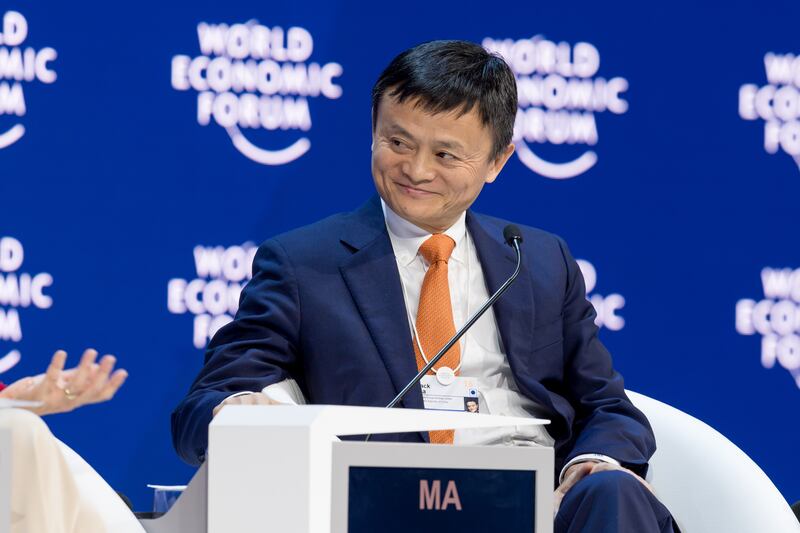
Jack Ma, former Executive Chairman of Alibaba Group Holding at the World Economic Forum in Davos | Source: WEF
Alibaba co-Founder and former Executive Chairman, Jack Ma, who is once again ranked as China’s richest person, could (almost unbelievably) have expected to be an even richer man this week, had the anticipated record-breaking IPO of Ant (the digital financial services company he owns most of) not been suspended at the last minute by Beijing’s regulators. As it stands now, he will have to content himself with the 400 billion yuan ($60 billion) he already has, an increase of 45 percent over last year. This fortune comes not only from Alibaba and its domestic platforms, but holdings in retailer Sun Art and Intime Department Stores, as well as its Southeast Asian e-commerce leader Lazada.
Tencent Founder and CEO Pony Ma, too, has seen an impressive rise is his wealth this year, up 50 percent to 390 billion yuan ($58 billion). Unlike Alibaba, Tencent’s revenue comes more from gaming than e-commerce but also from WeChat stores which have been widely adopted by fashion and luxury brands. Tencent is also an investor in Wanda Commercial Properties (China's largest owner operator of shopping malls), menswear chain Heilan, fashion e-commerce platform Vipshop.com and many other e-commerce platforms around Asia.
ADVERTISEMENT
Even as the pandemic decimated the livelihoods of millions across the global fashion value chain, many of the world’s wealthiest have not only survived with bank accounts intact, they have thrived. The combined wealth of the world's super-rich reached new peaks during the pandemic, according to a study published by the consulting firm PwC and the Swiss bank UBC.
The same can be said in China, but unlike the rest of the world, the country is also enjoying a rapid economic recovery, with a flurry of IPOs and a soaring stock market driving wealth creation. Rupert Hoogewerf, Founder and Lead Researcher of the Hurun Report, which has been tracking the wealth of China’s richest people since 1999, says the country’s uber-wealthy have created more money in the last year than in the five previous years combined.
China now has more billionaires that the US and India combined.
“It’s been an incredibly positive year for Chinese entrepreneurs,” Hoogewerf, said, perhaps unsurprisingly, a particularly good year for new economy entrepreneurs, who make up 40 percent of this year’s list.
A decade ago, China counted just 189 billionaires. In 2020, it is home to 878 billionaires with a combined wealth of $4 trillion who have made their fortunes on everything from pig farming (Qin Yinglin and wife Qian Ying) and bottled water (Zhong Shanshan) to drones (Wang Tao) and e-cigarettes (Chen Zhiping). According to data from Hurun, this means China now has more billionaires that the US and India combined (by its count, the US has 629 and India has 137).
Also in China's top ten is e-commerce mogul, Colin Huang, founder of group buying platform Pinduoduo, which is increasingly pivoting to fashion and beauty as it works its way up the value chain, reaching consumers in higher-tier cities, as well as those in its lower-tier strongholds. JD.com's Richard Liu and wife Zhang Zetian, meanwhile, saw their combined wealth surge 111 percent to 160 billion yuan ($23.5 billion) in 2020 largely thanks to JD.com posting its strongest growth in years as it continued to recruit more desirable international fashion brands from Delvaux to A-Cold-Wall.
Traditional Money-Makers Learn New Tricks
For all of China’s technological prowess, the majority of wealth still lies with those who make their money in a more old-fashioned way — through manufacturing and real estate, for example — though even in these industries, the biggest winners are those willing to try something new.
In fashion-adjacent manufacturing, by far the richest entrepreneurs are Chen Jianhua, chairman of Hengli Group and his wife Fan Hongwei, who chairs Hengli Petrochemical — one of the world's largest producers of polyester fabric. They are 20th on the Hurun list with wealth totalling 135 billion yuan ($20.2 billion), up 29 percent this year after the couple made the shock announcement in July that they were getting into the coal business — more specifically, the business of turning coal into clothing.
ADVERTISEMENT
Chen and Fan are placing a $20 billion bet on spinning coal into polyester yarn, to be used in clothing, packaging and plastic bottles. Though the project, which Hengli aims to have running by the end of 2025 in Shaanxi province, is the stuff of environmentalists’ nightmares, and obviously at odds with a global push to reduce reliance on fossil fuels, it fits into Beijing’s enduring commitment to coal and will add Hengli to a roster of Chinese companies, including coal miner Shenhua Group and oil refiner Sinopec, which have moved into the coal to chemicals business.
Real estate has long been analogous with wealth creation in China but some real estate moguls with significant retail and commercial property portfolios have seen their wealth dragged down in recent years, as high level of debt began to weigh heavily on their business.
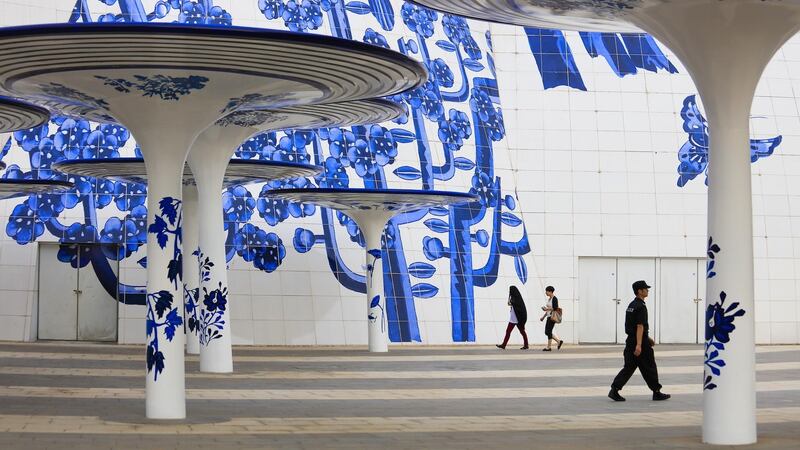
The Wanda Plaza mall in Nanchang | Source: Shutterstock
A case in point is Wang Jianlin, founder of Wanda's widespread network of shopping malls (there are more than 300 Wanda Plaza shopping centres around China and most of them are home to international fashion names such as Zara, H&M and Uniqlo), hotels and entertainment venues. A few short years ago, Wang was battling it out for first place on the rich list with Jack Ma. This year his ranking slipped 21 places, to 30th, and his family's fortune sank 8 percent to 110 billion yuan ($16.4 billion) as his business was negatively impacted by Covid-19.
Other retail real estate moguls have done better this year, though. Xu Rongmao, ranked 23rd with 130 billion yuan ($19.4 billion) total wealth, is probably better known by his Cantonese name, Hui Wingmau. The founder and the chairman of Shimao Group Holdings, a property developer with residential, hotel, and commercial properties (including the network of Shimao Plaza shopping centres across the country, which are home to fashion brands such as Nike, Pandora and Dior Beauty), has seen his family’s wealth grow 37 percent this year.
Earning a fortune through fashion bricks and mortar is becoming much harder than it once was in the country.
According to a 2019 interview with the South China Morning Post, Hui's son Jason Hui Sai-tan, Shimao's president, says the company sees future growth tied to its significant land holdings in the southern Greater Bay Area, a megalopolis encompassing the traditional fashion manufacturing centre of Guangdong province which is also where tech hub Shenzhen is located, along with neighbouring Hong Kong and Macau. In the future, the Chinese government hopes this area will rival the San Francisco Bay Area.
Shen Guojun is the founder of China Yintai, with interests in mining and, key to the fashion industry, the department store chain, Intime, which has seen its fortunes reversed from lacklustre to exceptional, largely thanks to its “new economy” makeover, driven by a partnership with Alibaba that has catapulted Intime to the leading edge of China’s omnichannel world of "new retail." His wealth of 56 billion yuan ($8.4 billion) grew 12 percent in 2020.
Their collective experiences show that real estate is still a cash cow in China, as the country remains one of the only markets in the wake of the pandemic in which it makes sense for fashion brands to be expanding their physical store footprint. But even within that bright spot, earning a fortune through fashion bricks and mortar is becoming much harder than it once was in the country.
Fashion Brand Founders Make (Smaller) Gains
Traditionally, China's domestic fashion giants have been built on mass market scale and store networks that are thousands strong across the country. This has been changing, however, in recent years, with sportswear giants, such as Anta and Li Ning, reacting to encroachment in market share from international players such as Nike and Adidas.
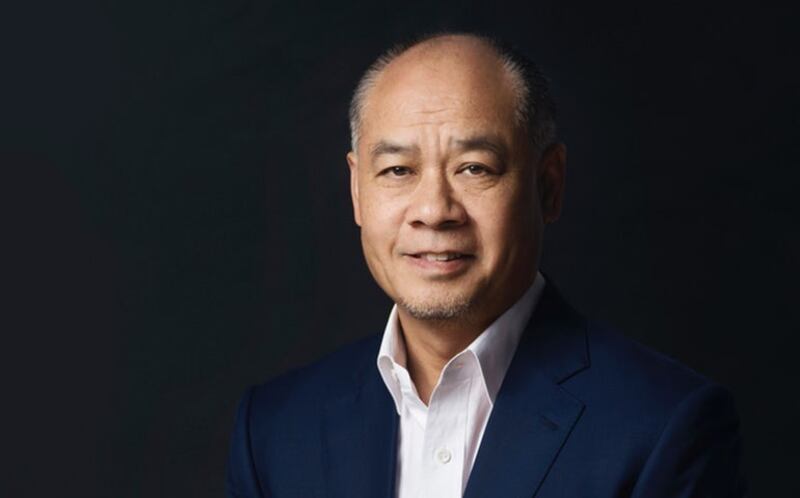
Li Ning | Source: Courtesy
Anta is unparalleled among fashion brands when it comes to the wealth it has created for the family of founder Ding Shizhong, who falls just outside the top 100 on the rich list, with a 44.5 billion yuan ($6.6 billion) fortune placing him 101st, while brother Ding Shijia sits at 106th with his 43.5 billion yuan ($6.5 billion). But the Dings are still not satisfied, aiming to acquire more international brand names in order to overtake the biggest players on earth.
″[A]s a single brand, we won’t be able to surpass Nike and Adidas,” Ding Shizhong told CNBC in a recent interview. “But with our multi-brand strategy, there is a possibility that we could.”
Meanwhile, the eponymous founder of Anta’s biggest domestic competitor Li Ning, has earned a personal fortune of 13 billion yuan ($1.9 billion). This may only put him at 414th on the rich list, but he has seen his wealth grow a sizable 63 percent over the past year as his company’s turnaround continues to gain ground.
Ma Ruimin and Ma Yixin of Dazzle shot into the fashion brand billionaire ranks with a 33 percent rise in wealth to $1.18 billion, Li Rucheng, founder of suit-maker Youngor, gained 14 percent to $1.75 billion and Trendy International's Xu Yu (also known as Jacky Xu) held steadily onto his fortune of $3 billion.
Even so, with no fashion brand entrepreneur among the country’s 100 richest people, it is plain to see that, in China, manufacturing for the world or selling fashion to Chinese consumers online tends to pay better than building a fashion brand.
Manufacturing for the world or selling fashion to Chinese consumers online tends to pay better than building a fashion brand.
“The average wealth on the rich list has gone up 37 percent, so fashion [brand builders have] not had a bad year, some might say that 15 percent growth on average is pretty good, but it’s not anything like the new industries in terms of the speed of growth,” Hoogewerf said.
The difference is even more stark when looking at brands that haven’t done the same work on brand building and digital transformation that the major sportswear players have, including the founders of high street giants Heilan (Zhou Jianping’s $5 billion), Semir (Qiu Guanghe’s $2.7 billion) and Metersbonwe (Zhou Chengjian’s $1.1 billion), who respectively saw their wealth fall 8, 23 and 6 percent this year.
These brands were disproportionately hurt, no doubt, by initial store closures at the beginning of the year and the patchy return to real-world retail in the initial months of China’s opening up, but the broader fashion, consumer and retail trends sweeping China are also working against their future gains.
One segment in which Chinese brands have been making waves is cosmetics, with C-Beauty brands reaching new heights of popularity in 2020. Though Perfect Diary is the name on everyone’s lips, with its parent company Yatsen Global recently filing for a long-awaited IPO that will likely soon make founder David Huang a billionaire, he hasn’t quite made the grade as yet, with Hurun estimating his wealth at 3.6 billion yuan ($530 million).
Another C-Beauty player, however, has shot up the charts, with Proya Cosmetics chairman Hou Juncheng and CEO Fang Yuyou rising 333 and 461 places in the list respectively, after seeing their personal fortunes each rise 136 percent this year. Hou now boasts a fortune of 13 billion yuan ($1.9 billion), with Fang not far behind with $1.25 billion. In the year ahead, it would be safe to bet on more C-Beauty names taking their place amidst the billionaire ranks.
In an industry as large and diverse as fashion, and in a country the size of China which lies at the centre of the global industry’s manufacturing sector and is its biggest and most profitable consumer base, there are a multitude of ways to become a fashion billionaire. One thing this year’s biggest winners have in common, whether their wealth comes from new ‘new retail’ technologies, or decidedly older ones, is an eye to the future in order to keep building their fortunes.
时尚与美容
FASHION & BEAUTY
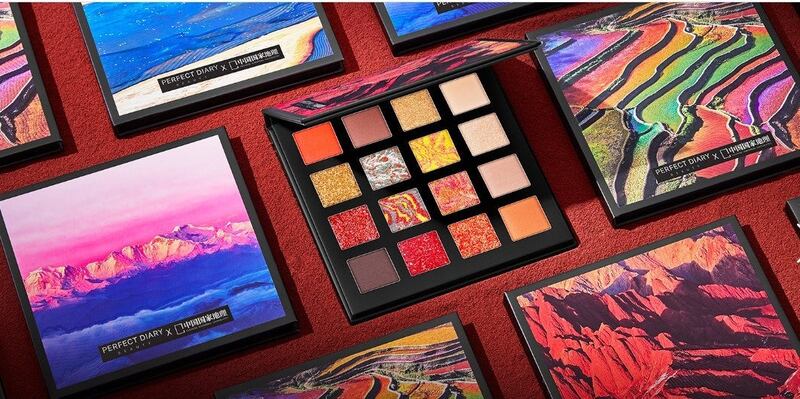
Perfect Diary eyeshadow palettes | Source: Courtesy
C-Beauty Unicorn Files for $100m IPO
Yatsen Holding Limited, which owns the cosmetic brand Perfect Diary, has filed for an initial public offering with the US Securities and Exchange Commission (SEC) to raise up to $100 million. Founded in 2016, the Guangzhou-based company, which targets younger consumers with budget products, has three cosmetics and skincare brands: Perfect Diary, Little Ondine, and Abby's Choice. For the nine months ended September 30 this year, the company claims that its three brands served 23.5 million customers by selling products directly to them, bypassing third-party retailers, wholesalers, and other middlemen. As of September, it has over 200 stores across over 90 cities in China. However, the company also generated a net loss of 1.2 billion yuan ($170.4 million) for the same period, according to the prospectus. In October, Yatsen also entered into an agreement to acquire the French skincare brand Galenic from Pierre Fabre, a French pharmaceutical and dermocosmetics group. (Tech in Asia)
Fashion Brands Jump on E-Sports Bandwagon
The 2020 League of Legends World Championship concluded in Shanghai on October 31, becoming the first major global e-sports tournament to take place in the Covid-19 era. South Korea's Damwon Gaming ended a two-year winning streak from Chinese teams when it defeated Suning Gaming to take the title, but the other big winners of the tournament may have been the brands who aligned themselves with the booming sub-culture. Bilibili, the exclusive China broadcaster for the championships, saw a 300 percent increase in viewers compared to 2019. Sportswear brands Nike and Li Ning both had highly visible placements as team sponsors, but luxury brands have also been keen to get into China's e-sports scene. Burberry recently announced a partnership with Tencent's Honour of Kings that will see elements of Burberry design introduced into the game's environment. (Content Commerce Insider)
科技与创新
TECH & INNOVATION

Alibaba's 12th annual Singles' Day festival | Source: Alizila
111 Minutes into Double 11, 100 Brands Boasted 100 Million Yuan in Sales
Tmall's Double Eleven shopping festival officially launched on November 1, with sales periods split this year on Alibaba's platforms between an initial sale running from November 1 to 3, with another sales period on the traditional date of November 11. Nike's turnover exceeded 100 million yuan ($14.9 million) one minute after the opening. As of 3:08am on November 1, the sales of makeup brand Perfect Diary exceeded 200 million yuan ($29.8 million), making it the first beauty player to exceed 200 million. In addition, sales of the domestic beauty brand Little Ondine, recently acquired by Perfect Diary's parent company Yatsen, saw sales increase by 1500 percent year-on-year in the first hour. In the luxury category, Coach superseded last year's Singles' Day GMV in just 30 minutes. (Ebrun)
Couriers Quit Before Singles’ Day, Citing Poor Pay and Conditions
The arrival of China's annual e-commerce extravaganza means delivery services in China are gearing up for an arduous month ahead. But this year, adding to the pressure to send billions of packages to a population that expects same-day delivery, major logistics companies are facing another challenge: couriers around the country have stopped showing up at work to protest low, unpaid wages and harsh work conditions. The root of the problem, according to labour activists and legal experts, is the business model: third-party agencies usually sign up couriers as contractors, rather than full-time employees entitled to benefits like sick days and health insurance. A price war between the large logistics companies has made things worse in the last year and a half. This has taken a toll on couriers, whose earning per delivery has been drastically reduced to 0.7 yuan ($0.10) this year. (SupChina)
消费与零售
CONSUMER & RETAIL
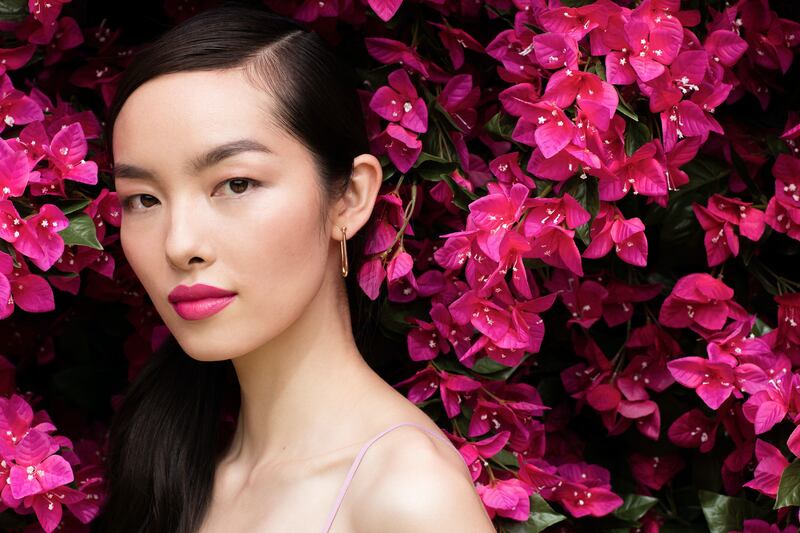
Fei Fei Sun for Estée Lauder | Source: Estée Lauder
China Travel Retail a ‘Stand Out Performer’ for Estée Lauder
Estée Lauder Companies recently reported net sales of $3.56 billion for its first quarter ended 30 September, a decrease of 9 percent on a reported basis and in constant currency terms. However, travel retail surged in China, led by business on Hainan Island. President and Chief Executive Fabrizio Freda said: "Asia Pacific again excelled with double-digit year-over-year growth in Mainland China. Travel retail was a stand-out performer as Chinese tourists were drawn to the growing duty free shops in Hainan Island and purchase limits increased there." (Moodie Davitt Report)
China’s Online Retail Sphere to be Shaken Up By Alibaba's Investment in FarFetch
Alibaba and Richemont's newly-announced investment in and joint venture with online luxury retailer Farfetch is likely to change the luxury e-commerce race in China in major ways. For starters, a new partnership between Farfetch and Alibaba and Richemont is likely to impact Farfetch's current strategic alliance with Tencent and JD.com, while Richemont and Alibaba's current tie up with the Yoox Net-A-Porter (YNAP) China business also complicates matters. Whatever the fallout, the interest of China's deep pocketed tech giants in international online luxury retailers seems to bode well for the growth of that market in China, as well as globally. (The Information)
政治,经济与社会
POLITICS, ECONOMY, SOCIETY
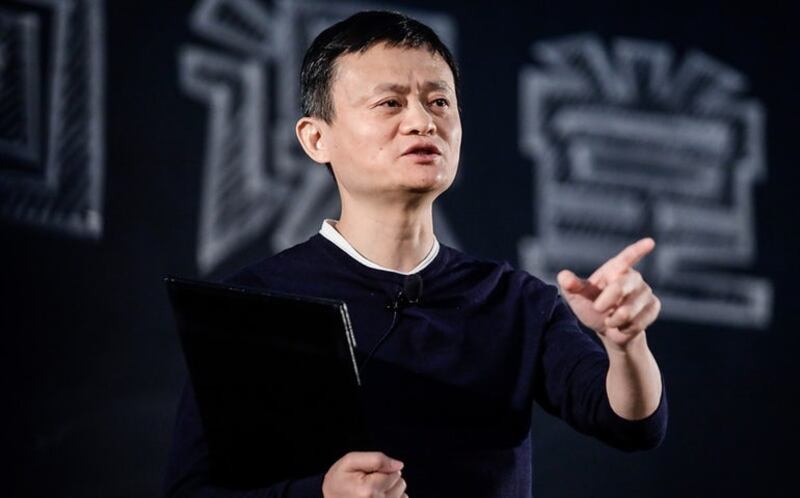
Jack Ma | Source: Getty Images
Ant Group’s $37 Billion IPO Plans Halted By Chinese Authorities
China has suspended the $37 billion listing of Ant Group, which had been set to become the world's largest IPO, one day after regulators grilled company founder, Jack Ma. China's largest financial technology company was set to list on Thursday in Shanghai and Hong Kong in a record-breaking IPO that had attracted huge interest from institutions and smaller investors. The Shanghai Stock Exchange said in a statement that Ma, who also founded Alibaba, had been called in for "supervisory interviews." There had been "other major issues," including changes in "the financial technology regulatory environment," the stock exchange said. In late October, Ma gave an inflammatory speech at a financial forum in Shanghai criticising state-owned banks and many are now linking this speech to the IPO's subsequent hold-up. (Financial Times)
China Manufacturing Records Fastest Expansion in Nearly a Decade
China's manufacturing activity expanded at the fastest pace in nearly a decade as a recovery in supply and demand continued to pick up speed in the post-epidemic period. The Caixin China General Manufacturing Purchasing Managers' Index (PMI), which gives an independent snapshot of the country's manufacturing sector, rose to 53.6 in October from 53 the previous month. The October reading was the highest since January 2011 and marked the sixth straight month of expansion. Readings greater than 50 indicate expansion. (Caixin)
China Decoded wants to hear from you. Send tips, suggestions, complaints and compliments to our Shanghai-based Asia Correspondent casey.hall@businessoffashion.com.
With consumers tightening their belts in China, the battle between global fast fashion brands and local high street giants has intensified.
Investors are bracing for a steep slowdown in luxury sales when luxury companies report their first quarter results, reflecting lacklustre Chinese demand.
The French beauty giant’s two latest deals are part of a wider M&A push by global players to capture a larger slice of the China market, targeting buzzy high-end brands that offer products with distinctive Chinese elements.
Post-Covid spend by US tourists in Europe has surged past 2019 levels. Chinese travellers, by contrast, have largely favoured domestic and regional destinations like Hong Kong, Singapore and Japan.